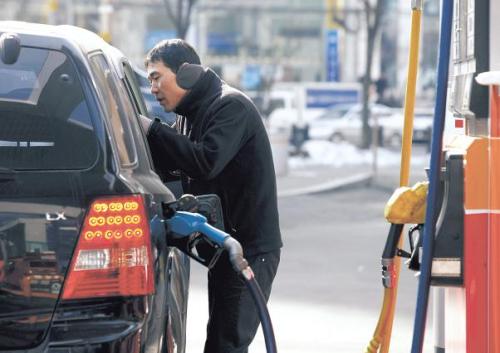U.S. delegation coming to Seoul to discuss sanctions against Tehran
Korean oil refiners are bracing themselves for a possible ban or reduction of oil imports from Iran as the U.S. urges countries to join sanctions on the Middle Eastern country.
A partial halt in oil supply from Iran, which accounts for 9 percent of the world’s crude oil production, would prompt countries to compete for alternative sources of crude oil, resulting in higher prices.
Higher oil prices will dampen the profitability of companies in the transportation sector such as airlines and heavy industries that use a lot of energy.
“A 10-percent rise in oil prices would cause gross domestic production to fall between 0.2 and 0.3 percentage points and an inflation of 0.15 percent,” said Lee Dal-seok, head of energy policy research at the Korea Energy Economics Institute.
“If Iran closes the Strait of Hormuz, international oil prices could shoot up above $200 a barrel for the first time in the short term and deal a blow to our economy.”
Korean oil refiners are bracing themselves for a possible ban or reduction of oil imports from Iran as the U.S. urges countries to join sanctions on the Middle Eastern country.
A partial halt in oil supply from Iran, which accounts for 9 percent of the world’s crude oil production, would prompt countries to compete for alternative sources of crude oil, resulting in higher prices.
Higher oil prices will dampen the profitability of companies in the transportation sector such as airlines and heavy industries that use a lot of energy.
“A 10-percent rise in oil prices would cause gross domestic production to fall between 0.2 and 0.3 percentage points and an inflation of 0.15 percent,” said Lee Dal-seok, head of energy policy research at the Korea Energy Economics Institute.
“If Iran closes the Strait of Hormuz, international oil prices could shoot up above $200 a barrel for the first time in the short term and deal a blow to our economy.”

Japan, the world’s second- largest buyer of Iranian oil after China, said Thursday after a meeting between its finance minister and his U.S. counterpart Timothy Geithner that it would further reduce imports from Iran.
A U.S. delegation led by Robert Einhorn, special adviser for nonproliferation and arms control, is scheduled to arrive in Seoul on Monday for talks on the sanctions, designed to pressure Iran to give up its nuclear program.
The Korean government plans to negotiate with Washington to minimize the reduction in Iranian crude oil imports, while reviewing the option of greater imports from the United Arab Emirates, Saudi Arabia and Kuwait. Korean Foreign Minister Kim Sung-hwan on Friday denied a news report that Seoul was seeking to halve Iranian oil imports.
Korea imported 82.6 million barrels of crude oil from Iran in the first 11 months last year, accounting for 9.8 percent of its oil imports. The share grew from 8.3 percent in 2010.
Iran is Korea’s fourth-largest source of crude oil after Saudi Arabia, Kuwait and Qatar.
More than three-quarters of the crude oil bought from Iran was purchased on long-term supply contracts, and the rest from spot markets.
The Seoul government has a three-stage plan, the first of which is to exempt Korea for this year from the application of the U.S. National Defense Authorization Act that bans economic entities dealing with the Iranian central bank from doing business with U.S.-based financial institutions. Because the Iranian central bank collects the country’s oil export revenues, the act, which goes into effect around July, essentially forces other countries to stop importing oil from Iran.
The act has a provision that provides exceptions for countries that reduce imports by “significant” amounts. States that have closely collaborated with the U.S. can be exempt from the act for 120 days.
The second stage is to shift the source of heavy crude oil imports to other Middle Eastern countries such as Saudi Arabia, Kuwait or the UAE, which will cost more.
According to the Korea National Oil Corp.’s petroleum database Petronet, Iranian petroleum was imported at $102.89 per barrel between January and November last year, cheaper than those from the UAE ($108.6 per barrel), Saudi Arabia ($106.29) and Kuwait ($104.71).
Korean oil refiners will have to pay tens of millions of dollars more annually, including the costs for transportation and replacing long-term deals with costly short-term purchases.
The stage-three contingency plans are for when Iran blocks naval traffic through the Strait of Hormuz as it has warned. This would bar shipments from other Middle Eastern crude oil as well, boding a crude oil crisis.
Seoul’s plans include releasing 181 million barrels of emergency petroleum reserves and 40 million barrels of global strategic petroleum reserves that it has prior purchasing rights to. This would keep the country running for about 70 days.
Of the four domestic oil refiners, SK Energy and Hyundai Oilbank import Iranian heavy crude oil, which takes up about 10 percent and 20 percent of their total crude oil imports, respectively.
The companies’ demand for heavy crude oil has been rising as they greatly expanded heavy crude oil refining facilities.
“We import Iranian heavy crude oil based on an annual contract,” said Kim Soo-hee, spokesperson for Hyundai Oilbank.
“The contract has no provisions on what to do in case of a government ban on imports from Iran, and it would incur great costs to make new deals with alternative suppliers and shippers.”
Other refiners such as GS Caltex and S-Oil will also be hit hard by oil price hikes in the event of a ban on Iranian oil.
By Kim So-hyun (sophie@heraldcorp.com)
-
Articles by Korea Herald




![[Herald Interview] 'Amid aging population, Korea to invite more young professionals from overseas'](http://res.heraldm.com/phpwas/restmb_idxmake.php?idx=644&simg=/content/image/2024/04/24/20240424050844_0.jpg&u=20240424200058)







![[Hello India] Hyundai Motor vows to boost 'clean mobility' in India](http://res.heraldm.com/phpwas/restmb_idxmake.php?idx=644&simg=/content/image/2024/04/25/20240425050672_0.jpg&u=)







